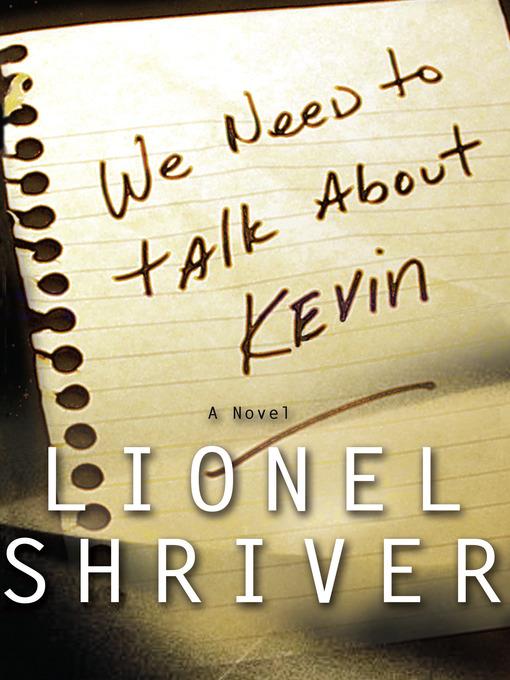
We Need to Talk About Kevin
کتاب های مرتبط
- اطلاعات
- نقد و بررسی
- دیدگاه کاربران
نقد و بررسی

Starred review from March 24, 2003
A starred or boxed review indicates a book of outstanding quality. A review with a blue-tinted title indicates a book of unusual commercial interest that hasn't received a starred or boxed review. WE NEED TO TALK ABOUT KEVIN Lionel Shriver. Counterpoint, $25 (416p) ISBN 1-58243-267-8 A number of fictional attempts have been made to portray what might lead a teenager to kill a number of schoolmates or teachers, Columbine style, but Shriver's is the most triumphantly accomplished by far. A gifted journalist as well as the author of seven novels, she brings to her story a keen understanding of the intricacies of marital and parental relationships as well as a narrative pace that is both compelling and thoughtful. Eva Khatchadourian is a smart, skeptical New Yorker whose impulsive marriage to Franklin, a much more conventional person, bears fruit, to her surprise and confessed disquiet, in baby Kevin. From the start Eva is ambivalent about him, never sure if she really wanted a child, and he is balefully hostile toward her; only good-old-boy Franklin, hoping for the best, manages to overlook his son's faults as he grows older, a largely silent, cynical, often malevolent child. The later birth of a sister who is his opposite in every way, deeply affectionate and fragile, does nothing to help, and Eva always suspects his role in an accident that befalls little Celia. The narrative, which leads with quickening and horrifying inevitability to the moment when Kevin massacres seven of his schoolmates and a teacher at his upstate New York high school, is told as a series of letters from Eva to an apparently estranged Franklin, after Kevin has been put in a prison for juvenile offenders. This seems a gimmicky way to tell the story, but is in fact surprisingly effective in its picture of an affectionate couple who are poles apart, and enables Shriver to pull off a huge and crushing shock far into her tale. It's a harrowing, psychologically astute, sometimes even darkly humorous novel, with a clear-eyed, hard-won ending and a tough-minded sense of the difficult, often painful human enterprise. 4-city author tour. (May)Forecast:The subject, unfortunately, is nearly always timely, and this by no means sensationalist account can be confidently sold as the best novel of its kind; in fact, the extent of the author's insights should make her very promotable.

May 1, 2003
The timely topic of Shriver's (Double Fault) eighth novel is sure to guarantee lots of attention, but the compelling writing is what will keep readers engaged. This is the story, narrated in the form of letters to her estranged husband, of Eva Katchadourian, whose son has committed the most talked-about crime of the decade-a school shooting reminiscent of Columbine. From the very beginning, the reader knows that Kevin has been found guilty and is in a juvenile detention center, yet the plot is never stale. Shriver delivers new twists and turns as her narrator tells her story. Through Eva's voice, Shriver offers a complex look at the factors that go into a parent-child relationship and at what point, if any, a parent can decide if a child is a hopeless case. This novel will appeal to fans of Rosellen Brown's Before and After. Recommended for all public libraries.-Karen Fauls-Traynor, Sullivan Free Lib., Chittenango, NY
Copyright 2003 Library Journal, LLC Used with permission.

Starred review from May 1, 2003
In a series of brutally introspective missives to her husband, Franklin, from whom she is separated, Eva tries to come to grips with the fact that their 17-year-old son, Kevin, has killed seven students and two adults with his crossbow. Guiltily she recalls how, as a successful writer, she was terrified of having a child. Was it for revenge, then, that from the moment of his birth Kevin was the archetypal difficult child, screaming for hours, refusing to nurse, driving away countless nannies, and intuitively learning to "divide and conquer" his parents? When their daughter, loving and patient Celia, is born, Eva feels vindicated; but as the gap between her view of Kevin as a "Machiavellian miscreant" and Franklin's efforts to explain away their son's aberrant behavior grows wider, they find themselves facing divorce. In crisply crafted sentences that cut to the bone of her feelings about motherhood, career, family, and what it is about American culture that produces child killers, Shriver yanks the reader back and forth between blame and empathy, retribution and forgiveness. Never letting up on the tension, Shriver ensures that, like Eva, the reader grapples with unhealed wounds. (Reprinted with permission of Booklist, copyright 2003, American Library Association.)

























دیدگاه کاربران